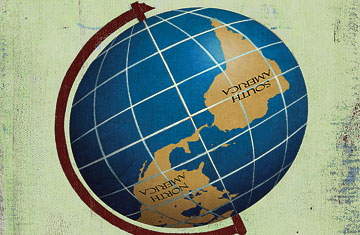
(2 of 2)
Sagging growth means even the biggest boosters of free markets and free trade are being a lot quieter these days. While the U.S. government refused to step in to save Lehman Bros., it did intervene to rescue AIG, Fannie Mae and Freddie Mac, in moves that, in ideological terms, amount to a significant retreat from the sort of market liberalism that Washington has long embraced. And skepticism about the benefits of globalization appears to be rising: an international poll earlier this year by GlobeScan shows that, while majorities in most of the 18 countries surveyed continue to support the notion of free markets, there has been a significant erosion of support in Turkey, South Korea, Chile, Britain, Mexico, Russia, Brazil and even China. That's not surprising, says Andrew Watt, an economist at the European Trade Union Institute in Brussels. "It's hard to sustain the idea that markets are perfect and should be left to work against the background of what has happened in the last year." What's less clear is the extent to which this skepticism will feed into national politics and provoke a new bout of international protectionism. Watt and others point out that while globalization has created substantial wealth around the world, its benefits have been distributed disproportionately.
Pockets of Resilience
The good news is that lower growth in emerging markets is relative. Even at an 8-9% annual growth rate, the lower end of economists' predictions for this year and next, China's economy would still be racing ahead, just not at the feverish double-digit rates of recent years. In fact, a cooler international climate could prove beneficial if it helps Chinese authorities to get a grip on inflation and minimize other problems of an overheating economy. There are still only scant signs of a slowdown in other fast-growing countries. Russia's economy is expected to cool this year to about 7% growth, and some highly leveraged businesses there are experiencing the beginning of a liquidity squeeze. But Brazil this month reported that its economy actually accelerated in the second quarter, with growth rising to an annual rate of 6.1%. Meanwhile, the Gulf states and other countries in the Middle East are in the midst of a petrodollar-driven consumption boom that shows little sign of slowing, even though oil prices have fallen below $100 per barrel.
Puzzling Patterns
This resilience helps to explain why De Beers' diamond sales are still thriving: Americans may be less willing to splurge on fancy rings, but from Abu Dhabi to Shanghai, bling is still very much in — and the bigger the better. This is hardly proof that U.S. economic growth and free-spending American shoppers are no longer important to the global economy. Economists at French bank Société Générale have calculated that consumption in the BRIC countries — Brazil, Russia, India and China — would have to rise by almost 25% to fully offset the effects of a U.S. recession, an increase that's beyond even their dynamic capacities. But the linkages of the past no longer seem to be reliable indicators of the direction of individual economies. "Clearly, we're in a period of uncertainty and volatility, and we'll have to get used to it," says Mark Spelman, a globalization-strategy specialist at consulting firm Accenture in London. "The patterns are more confused," says Spelman, who describes the current economic situation as "two steps forward and one step backward."
One trend appears to be intact: companies from China, India, Brazil and other emerging markets continue to make strong inroads on the world scene. Indeed, in FORTUNE's ranking of the top 500 global companies, 61 on this year's list are from emerging countries, up from 55 last year. Bhagwati at the Council on Foreign Relations says there is "very little evidence that people are actually trying to close markets." Indeed, he's optimistic that the current stalemate over a new international trade agreement could be broken after the U.S. presidential election in November, and that the so-called Doha round of World Trade Organization negotiations could reach a conclusion next year, providing more open trade in services and agriculture. At a time when the unexpected is happening, he may or may not be right. But for the moment, at least, the betting is still that globalization, like a diamond, is forever.